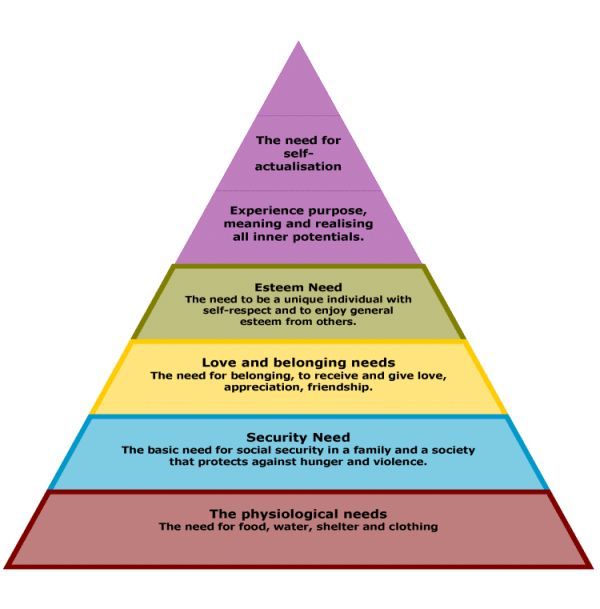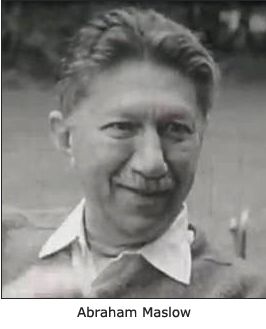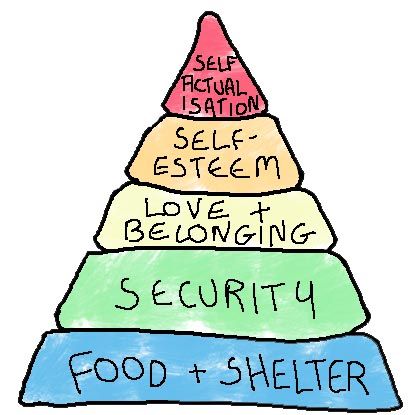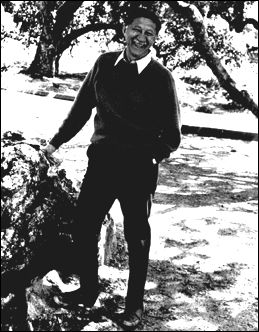
Publisher:
Bonnie King
CONTACT:
Newsroom@Salem-news.com
Advertising:
Adsales@Salem-news.com

~Truth~
~Justice~
~Peace~
TJP
Mar-09-2013 14:14

 TweetFollow @OregonNews
TweetFollow @OregonNews
How Maslow's Hierarchy Can Save the World
Richard Reid for Salem-News.comIdeological and political constraints conflict with the human need to adapt and evolve.
 Abraham Maslow |
(SALEM) - Citizens everywhere are caught in a political power struggle that has nothing to do with them. Those elected to represent the people are increasingly representing ideologies.
In the meantime historic changes confront us because natural resources are declining as population and consumption increase.
Long term weather trends are disrupting centuries of predictable agricultural production and economic development, making survival more challenging for millions. Centuries of assumptions about money, value, and debt are being recalculated. Both natural and man-made disasters challenge accepted geo-political roles and responsibilities..
International alliances fluctuate and more country leaders are thwarting beneficial public policy.
Fortunately self reflection continues to flourish and studies of human intelligence reveal how humans are uniquely designed to empower themselves to adapt and evolve.
Donald Brownʼs 1991 book, Human Universals lists hundreds of attributes that are unique to humans around the world. No matter which culture, society, language, or psyche, we are far more alike than different.
Science and human experience increase our understanding of how all organisms seek sustenance and security in the deadly serious competition for survival. We understand how all organisms trend toward complexity and establish both cooperative and competitive networks. But ideological and political constraints conflict with the human need to adapt and evolve.
 |
Like all social organisms, humans both rely on and support their groups (family, pod, pride) and their groups in turn assist individual survival. A flourishing individual is more capable of both living independently and enriching the group experience.
The benefits of cooperation and collaboration may have been lost several thousand years ago when humans started down an evolutionary path quite different from all other social organisms. In spite of gains in science and self-knowledge since then, we still select leaders and distribute power much as we have been for thousands of years.
Many are beginning to suspect that our lack of progress in leadership selection may have made our survival more difficult.
Early humans selected leaders based on consensus about the leaderʼs ability to understand and further the survivability of the group.
Gradually definitions of power changed from band to tribe to chief to state, until leadership was almost exclusively identified with the ability to secure resource monopolies and wage war. Power and wealth became the sole criteria of leadership until power inequality became the norm. But power inequality suppresses individual initiative, threatens intellectual curiosity and inhibits creativity. Progress is impossible without them.
When cultural control relies on power, compassion and wisdom are less necessary for leadership and leaders devoid of basic intelligence or morality become more common.Power inequalities arising from intellectually inadequate, morally flawed leadership quash progress.
Populations languish when their ability to obtain adequate food, clothing and shelter is diverted to sustain power inequalities. Health, security and life enrichment are considered luxuries by those disenfranchised by power inequality.
When sustaining power inequality becomes intolerable, attempts to create and adopt democratic forms of governance increase. Eventually new regimes seize power and some of them select democratic leaders. Under democratic governance, leadership selection represents a broader consensus for controlling wealth and arms.
Unfortunately, ideology and party allegiance threaten democracy by clouding choices about leaders, elections, policies and wealth distribution.
Under ideology and party allegiance Societies drift because individuals must focus time and talents on promoting ideology and allegiance rather than on self-actualization or creatively fulfilling social responsibilities.
When money defines power and leadership, it brushes aside science and insights about the exchange between individual self-actualization and group success. Giving their allegiance to money, leaders feel less need to empower the individuals they govern to become unfettered members of society.
When education and science provide insight and ideas about motivation theory they are threatened by ideologues with money. The ignorant refusal to adopt scientific conclusions or innovation sacrifices both imagination and efficiency. Progress gives way to superstition.
 |
Perhaps one of the greatest superstitions is that large groups of humans are incapable of amicably self-organizing, agreeing on the greatest good for the greatest number and respecting the balance between altruistic and self-centered behavior. Fortunately a guide exists that challenges the superstition and offers a path to attaining our highest potential without denying the same opportunity to others. Based on motivational theory, the guide is a simple list of what people need to reach their highest potential.
Abraham Maslow was one of the first to introduce motivation theory to the world. (See End notes) His theory of motivation described how our goals are determined by our needs. When we are thirsty our goal is to drink and once our thirst is quenched that need becomes less urgent and is replaced. Another “higher” need becomes dominant.
Maslow said we are “perpetually wanting” animals constantly shifting from satisfied toun satisfied wants. As we make these shifts we learn better strategies for satisfying our needs. Normal healthy behavior includes managing our energy and economic resources by setting short and long-term goals.
Unlike most of his colleagues Maslow studied “self-actualized” individuals who had developed skills that enabled them to understand and satisfy “higher” needs beyond those necessary to survive. As needs are met more consistently, motivation which may have been directed to satisfy “lower” needs (ex. food, clothing, shelter) is increasingly diverted to satisfying needs that result in self-actualization (ex. esteem, a sense of purpose). Maslowʼs insights are now referred to as Maslowʼs Hierarchy of Needs and they provide a useful model for those interested in self-actualization.
Maslowʼs Hierarchy of Needs
Maslowʼs Hierarchy is an effective model for getting the most out of life. Aside from the obvious physiological and security needs the rest are sought and satisfied in a variety of times and ways throughout a lifetime. The model is also a guide for providing essential services that enrich a culture by empowering the individual.
Having a list of needs before us takes some of the guesswork out of self-actualization.Obviously some needs are essential to survival while others are more important for self-actualization. Satisfying most of the needs requires supportive and empathetic engagement that comes naturally from those with some level of self-actualization. This “positive feedback loop” between “student and mentor” is familiar to many.
Because Self-actualization is essential to human existence, communities of self-actualizers can be found in all cultures. Maslow listed a number of characteristics of the self-actualizers he studied that makes it easier for us to recognize them.
Regardless of age, education, sex or wealth, self-actualizing people are noticeably comfortable with themselves; although task centered and autonomous they still share abroad fellowship with humanity.
Self-actualizers have the rare ability to judge situations correctly and honestly. They donʼt tolerate fakery or dishonesty but they are nice about it. Self-actualizers accept their own flawed human nature and extend this acceptance to othersʼ shortcomings and to the contradictions of the human condition.
They are noted for their wonderful capacity to laugh at themselves. Although self-actualizers are unlikely to make jokes that hurt anybody, their wry comments amount to gentle observations about human shortcomings. This acceptance of themselves and those around them may explain why self-actualizers are spontaneous and comfortably extend their creativity into everyday activities.
You can always spot self-actualizers because they tend to be unusually alive, engaged and unconstrained. They are free from reliance on external authorities or other people and tend to be resourceful and independent.
That resourcefulness and independence are often expressed in a sense of “mission”; pursuing some task or problem beyond themselves (instead of outside of themselves). Related to this was Maslow's discovery that self-actualizes have a deep identification with others and the human situation in general. Maslow concluded that the interpersonal relationships of self-actualizers are marked by deep loving bonds.
Despite their satisfying relationships with others, self-actualizers are also the ones willing to leave the party before it is over. They value solitude and are comfortable being alone. Being comfortable with themselves explains why self-actualizers seem to constantly renew their appreciation of lifeʼs little pleasures. Their “innocence of vision” is like that of artists and children.

Self-actualizers reported to Maslow that they had frequent “peak experiences”; temporary moments filled with ecstasy, harmony, a sense of deep meaning. They reported “feeling at one with the universe,” “stronger and calmer than ever before,” even “filled with light.” Self-actualizers make terrific mentors because living a fulfilling life serves as an example to those around them. Leading a fulfilling life requires some persistence but relatively little personal expense. Government endorsement of self-actualizion behavior involves no complicated government intervention.
Public agencies and institutions that support self-actualization are already in place and funded.
Organizing public services to feature needs like esteem, physiological, love/belonging and security is uncomplicated and desperately needed by those challenged by natural and man made disasters.
Maslow acknowledged that self actualization depends on preconditions like the freedom to express and explore ideas. Freedoms and other democratic ideals provide a secure environment for both individuals and societies by assuring that one does not unduly encroach on the other. Maslowʼs Hierarchy is an articulation of the Golden Rule.
because the Hierarchy sets a course societies should embrace when their goal is for individuals living them to flourish. Social progress occurs when people accept the truth of their own self-worth, claim their personal power and refute inequality. Once empathy and encouragement flourish in self-actualizing cultures power structures eventually give way. Motivational theory can empower inclusive societies where most people can satisfy their needs most of the time and are empowered to assist others. Unfortunately, those who believe their power and status exists outside themselves resist rights that lead to inclusive societies.
 |
Maslow described the negative feedback loop that is triggered when self-actualization is thwarted. Increasingly aberrant behavior interferes with self-actualization and prevents further progress. Unable to appropriately meet their needs, individuals get anxious and often revert to aggressive selfish behavior. Frequently only outside intervention or tragedy can break the negative feedback loop. Numerous current public programs and agencies are already supporting citizens caught in these loops. Using Maslowʼs theory of motivation to enable citizens journeys through the hierarchy of needs helps them create a positive feedback loop.
Abundant evidence reveals that when individuals flourish they enrich the societies they inhabit. Even after 500 years we continue to be enriched by the Renaissance thanks to the patronage that made it possible.
But patronage also funds politics that lead to self perpetuating power inequalities.
Money in politics finances the ideology of powerful minorities who limit public policy choices, perpetuate economic injustice and enshrine class differences.
Individuals in suppressed populations have fewer resources or opportunities to express the Golden Rule. Cultural activity atrophies in societies where the symbiotic relationship between individuals and their groups is compromised.
Withdrawing support from the exchange between individuals and their societies leads to unintended consequences and places additional burdens and complications on leadership.
Dying cultures and entropy and are impossible to predict or turn around. On the other hand a flourishing society engages a variety of talents and perspectives from willing subjects in the challenges of adaptation and survival.
Fortunately research is revealing how one aspect of the Golden Rule, narrowing the range between high and low income, correlates with social benefits. The Spirit Level demonstrates how child well-being, cultural activity, imprisonment, social mobility all improve in societies where income is equal. (See: End notes)
The reduction or elimination of social problems creates broad positive effects and creates more opportunities for self-actualization. Maslowʼs Hierarchy reminds us of that truth and provides a simple path to its reality. Because they detail the commonality of experience, Brownʼs Universals offer the promise of broad understanding and acceptance of motivation theory and Maslowʼs practical guide to self-actualization.
End notes:
“Abraham Maslow was one of the first …” Page 4See: A Theory of Human Motivation, A.H. Maslow; Psychological Review, 50, 370-396(1943). http://psychclassics.yorku.ca/Maslow/motivation.htm]
“The Spirit Level demonstrates how child well-being…” Page 9 See: The Spirit Level: Why more equal societies almost always do better, Richard Wilkinson and Kate Pickett, Bloomsbury Press, NY, 2010
 |
 |
 |
Articles for March 8, 2013 | Articles for March 9, 2013 | Articles for March 10, 2013



Salem-News.com:
googlec507860f6901db00.html
Quick Links
DINING
Willamette UniversityGoudy Commons Cafe
Dine on the Queen
Willamette Queen Sternwheeler
MUST SEE SALEM
Oregon Capitol ToursCapitol History Gateway
Willamette River Ride
Willamette Queen Sternwheeler
Historic Home Tours:
Deepwood Museum
The Bush House
Gaiety Hollow Garden
AUCTIONS - APPRAISALS
Auction Masters & AppraisalsCONSTRUCTION SERVICES
Roofing and ContractingSheridan, Ore.
ONLINE SHOPPING
Special Occasion DressesAdvertise with Salem-News
Contact:AdSales@Salem-News.com
Terms of Service | Privacy Policy
All comments and messages are approved by people and self promotional links or unacceptable comments are denied.
[Return to Top]
©2026 Salem-News.com. All opinions expressed in this article are those of the author and do not necessarily reflect those of Salem-News.com.